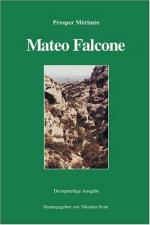|
This section contains 562 words (approx. 2 pages at 400 words per page) |

|
Culture Clash
"Mateo Falcone" concerns the cultural clash between savagery and civilization. The French, in particular, developed these themes, beginning with the work of Jean-Jacques Rousseau, whose Essay on the Origin of Inequality Among Men (1854) presented the notion that primitive people were uniquely free and true to themselves in their existence, while civilized people, on the contrary, led corrupt, hypocritical lives. Health and simplicity were associated with the savage, according to Rousseau, and neurosis and complexity to the "civilized" human being.
Merimee was not a follower of Rousseau, however, even though he was interested in Rousseau's philosophy. Merimee's idea of savagery was actually grounded in classical literature. Thus the Corsican ways described in the tale resemble those of the Cyclopes in Homer's Odyssey. The Cyclopes, like Merimee's Corsicans, are island-bound pastoralists; the Cyclopes understand a basic and brutal code of vengeance.
Law and Order
In "Mateo Falcone," vendetta assumes...
|
This section contains 562 words (approx. 2 pages at 400 words per page) |

|




